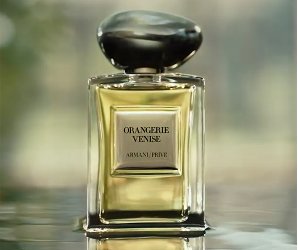
Giorgio Armani will launch Orangerie Venise, a new fragrance in the Armani Privé fragrance range.
ORANGERIE VENISE is a zesty, elegant and long-lasting scent. Exquisite and voluptuous, it draws on the different facets of the Bigarade Orange, translating its flowers into delicate, luminous notes of Neroli essence and its fruit into fresh, bitter and rich citrus notes. The woody scent opens with the sparkling notes of Bergamot, combined with the fruity and vibrant freshness of Buchu, against a distinguished woody drydown of cedarwood, moss and ambroxan.
Orangerie Venise was developed by perfumer Dominique Ropion.
Armani Privé Orangerie Venise will be available in 100 ml.
(via Armani Beauty at YouTube)
In all seriousness, I don’t understand why every new perfume has ambroxan listed. Is it to make it last longer? I don’t think I’m getting what it’s supposed to smell like. I just know in most cases now, it bothers me.
I think there was always lots of ambroxan, it’s just becoming more acceptable to say the chemical name instead of saying “amber” or “ambery woods” or “Amberwood” or whatever.
Will also add that I do not know that every time you see the note “ambroxan” listed, you are even smelling the same aromachemical. Most of the big F&F houses have one or more captive versions of ambroxan…and they don’t all smell exactly the same. If a company is using Ambrox Super, or Ambrofix, does it just get listed as Ambroxan in the PR?
Odd, isn’t it, that chemical names like Ambroxan even make it into the PR? Doesn’t seem aspirational or “romantic” in the same way that “ambery woods” is supposed to be. Do the PR folk count on the audience’s knowing (or thinking they know) a little bit about what Ambroxan, or Iso-E Super is?
Don’t really care about Ambroxan one way or the other, but I think the other notes listed actually sound kind of promising.
I think the ones that creep in tend to have good names. I see iso e super only rarely, and I think it is because it is not a good name…it sounds too chemical. Petalia, Paradisone, etc….these are good, consumer-friendly names.
But also, would be interesting to know if the term ambroxan appears more often in lists for men’s fragrances and paradisone (for example) for women’s…in other words, if they only list the chemical names that they think fit the gender designation of the finished product.
I guess I get it. It’s just everything seems to smell so chemically and similar in the drydown and it seems like the drydown comes so fast now. Maybe I’m just now noticing it because I’m smelling more perfumes than I used to. Thanks for answering.
Well, that is true too, and I think the other side of it is that there are just exponentially so many more perfumes, and such a huge proportion are trying to follow the same trends…it is indeed a problem. I am smelling far fewer perfumes than I used to, otherwise I’d be totally burned out on the subject.